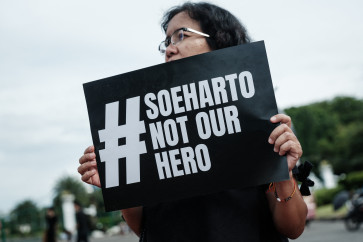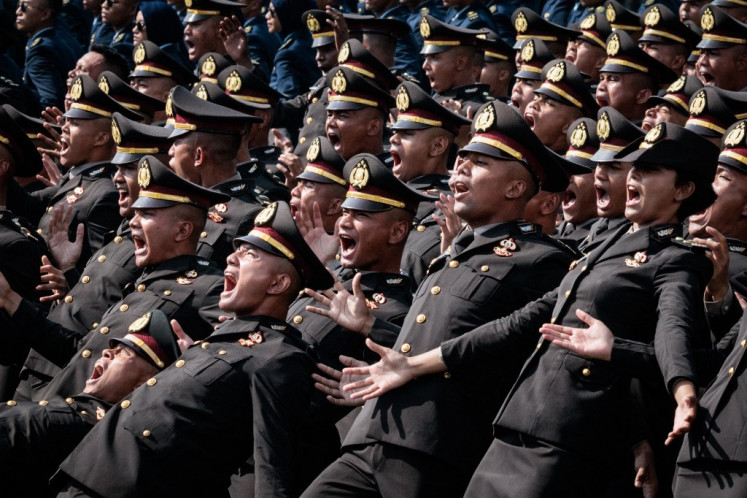Popular Reads
Top Results
Can't find what you're looking for?
View all search resultsPopular Reads
Top Results
Can't find what you're looking for?
View all search resultsTwilight of Golkar’s revolutionary role
The victory of Setya Novanto in the Golkar chairmanship race may not be good news for the party
Change text size
Gift Premium Articles
to Anyone
T
he victory of Setya Novanto in the Golkar chairmanship race may not be good news for the party.
Fresh from a bitter internal rift that lasted almost two years, Golkar’s choosing of Setya at its extraordinary congress in Bali marks the party’s return to its origins as the government party, or the ruling party, a role it played during Soeharto’s New Order.
Born as the government’s resistance to political and social crises caused by the multi-party system under Sukarno, Golkar initially comprised non-partisan mass organizations coordinated by the military under Guided Democracy.
The 1965 tragedy brought down Sukarno and wiped out the Indonesian Communist Party (PKI), a major political party at that time, and catapulted Golkar, the anti-political party, to power.
The party had been prepared as a political vessel for Soeharto, who was seeking to participate in the 1971 election.
Years later, Golkar became a major force outside of the government after the downfall of Soeharto, at the beginning of the Reformation era, thanks to the strong leadership of Akbar Tandjung, a former student protester and leader of the Association of Islamic Students (HMI).
Akbar’s leadership began the party’s journey as an independent entity that often criticized the government. Despite still being part of the Cabinet, it took an opposition role during the tenure of former president Abdurrahman “Gus Dur” Wahid.
The party’s lawmakers were known to be the propellers of an inquiry at the House of Representatives into Gus Dur’s alleged misuse of State Logistics Agency (Bulog) funds that led to his impeachment in 2001.
Jusuf Kalla and Aburizal Bakrie, both entrepreneurs from local business dynasties that later led Golkar, played a somewhat disguised but extreme opposition role during the two terms of former president Susilo Bambang Yudhoyono.
Golkar’s maneuvers caused dysfunction in the House in 2004, during the early months of Yudhoyono’s administration, before Kalla, then vice president, became the party chairman. But his leadership only quelled the party’s critical position toward the government for a while.
Under Aburizal, the party was a major supporter of the Bank Century inquiry in the House that led to the resignation of then finance minister Sri Mulyani Indrawati.
Aburizal later put Golkar in place as the leader of the opposition camp, after the party’s failures in the 2009 presidential elections, a role that prompted an internal rift at the party that lasted until earlier this year.
Setya, who has found his fortune and his political acumen through relationships with the party’s senior members since he was a teenager, may not be able to sustain this opposition stance, either disguised or apparent, that has lasted since Akbar’s era.
He is known as the party’s field operative involved in many political and business deals that border on illicit practices.
The current political circumstances have favored his rise. The government needs to create political stability by ending Golkar’s opposition under Aburizal and securing a victory for President Joko “Jokowi” Widodo in the 2019 election.
With a lack of charisma, Setya is believed to be a good vessel for any government leader needing political backing – a similar position to what the party maintained during the New Order.
But unlike under Soeharto, he may find it difficult to rally full support of the party elite for Jokowi.
Too many hands have a grip on the party. Aburizal has kept his clinch on Golkar by becoming the party’s chief patron, a position that was previously made for the country’s longest-serving president.
Kalla, once again vice president under Jokowi, and Chief Security Minister Luhut B. Pandjaitan, who made the pair’s rivalry for getting hold of the party apparent during the chairmanship race, have made the party a stage for their power struggle.
Kalla’s command over the party might not have been complete during Yudhoyono’s tenure, but it may now pose a challenge for Setya, who has been supported by Luhut, amid the government’s ebbing and flowing relationship with the ruling Indonesian Democratic Party of Struggle (PDI-P).
Setya’s rival in the chairmanship race, Ade Komarudin, the House speaker who received Kalla’s support, may become his operative in the House for garnering support for opposing Luhut.
A well-connected politician who participated in the House inquiry to topple Gus Dur, he may also lend some force to the PDI-P when it disagrees with the government.
Setya will be in a constant dilemma as he manages the party. If he fails to mend ties with Ade and Kalla, while containing Aburizal, the party’s support for Jokowi will be divided and could be easily overridden by other political forces in the House.
But if he succeeds, it may mean a compromise on Luhut’s and Jokowi’s interests.
Golkar’s waning political power has already been reflected in the first concurrent regional elections last December. Despite being winner of the second-most votes in the 2014 legislative election,
Golkar ranked ninth in December, only winning in 55 out of 264 regions contested. The post-2014-election internal rift had paralyzed the party, causing it to lose in many regions.
Setya has vowed to support Jokowi in 2019. But without bold moves to consolidate the party, Golkar will continue to deteriorate and will probably not matter in the next presidential election.
Too tight a grip may shrink or even rip apart the party, rather than get full control of it.
__________________________________
The author is a staff writer at The Jakarta Post










